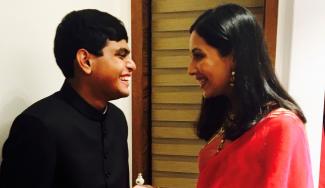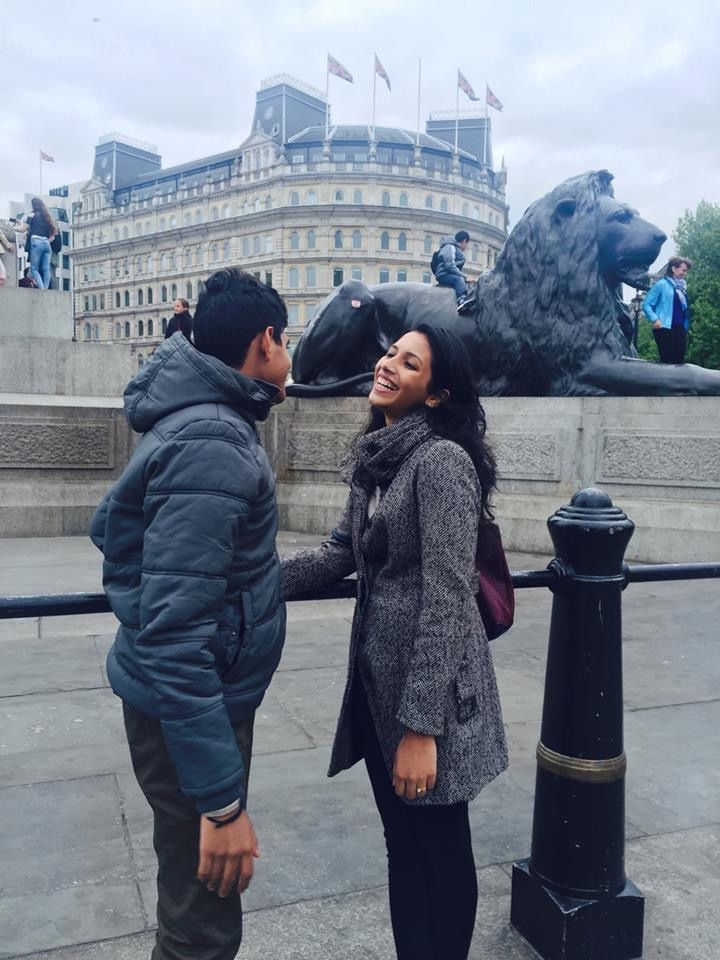
Shreya Jain, neurodiversity advocate and founder of Reservoir, talks about her brother on the autism spectrum and how she provides financial and legal security solutions to the special needs community.
Could you tell us a bit about your brother? How has autism shaped your relationship with him?
My brother, Suvrat, was diagnosed with autism at the age of two and a half years. I was about 7 at the time. I remember my mom running across the country with this little baby boy because she thought he wasn’t doing okay. The rest of the family, and most doctors we met, couldn’t see what the fuss was about. It was a case of regression. She had to really fight her way to get help. I remember visiting a lot of doctors, accompanying them to therapy sessions. I spent my breaks at Action for Autism, in Delhi where my brother was attending the mother child training with my mum.
Over the years, my role grew from a spectator to an active participant. He’s a sportsman now, and we learnt how to swim, cycle and skate together. He’s such a large part of my life!
You know how they say, autism is a spectrum? Even my brother’s autism is a spectrum. There are good days and bad ones. But I know I can’t have one without the other. One of his quirks that really annoys me, is how he laughs when someone is crying. Especially when I cry- it’s loud and dramatic- he finds it reallyyyy funny. But then knowingly-unknowingly, he’ll spare me a smile on a bad day. Our relationship sometimes feels one-sided, since he’s nonverbal, but then he finds a way to make me feel special and loved.
Does the state of the sibling bond change during later adulthood? What has been your experience?
Suvrat turned 21 a few months ago. He’s a young, handsome man and the central pillar of our home. The first thing I can tell you about him is that he binds us together. He’s the glue that held my family together over all these years- with all his love and forgiveness.
Of course things change with time, just like all relationships do. There are parts of my life where he’s not on the forefront anymore, but he’s always on the back of my mind. Even when I’ve dated someone, it’s so important to see how they are with my brother. I don’t even mean if they treat him with respect or no, that’s of course a given- but how comfortable they are around him. I remember the first time my fiancé met my brother, Suvrat snatched his burger and ate half of it in a single bite. We couldn’t stop laughing, but then I also saw him give him another bite from the remaining half.
Suvrat isn’t the compliant and shy kid he once was - he’s strong minded, rigid and a brat. (just like his sister!) Now that he’s older- it’s tougher to plan holidays now, it’s not cute anymore if he takes food off someone’s plate in McDonald’s and it’s much harder to reason with him when he’s having a meltdown in a public place. But growing up with him allowed me to experience unconditional forgiveness and silent love. My values, my empathy and a large part of who I am, I owe it to him. Unlike anyone else who does anything for you, Suvrat doesn’t want any credit. On the contrary, he’s completely unaware of the magic and madness he continues to create in our lives, every single day.
Parents are often worried about the future of children on autism spectrum disorder. What steps has your family taken to build an inclusive environment for your brother?
My family decided very early on, that we’re going to take Suvrat everywhere - he’s going to have new experiences and the fact that he has autism, is not going to be a deterrent. Sometimes things will go smoothly, sometimes they won’t, but we will deal with the rest of the world as and when.
My brother loves going to theatres and eating out. His behaviour would sometimes grab a lot of attention. It took us a lot of time but we came up with ideas that would make us and everyone around us feel comfortable. For example, we started going to movies 15 minutes early. We would tell our neighbours - next to us, behind us and people sitting in front, that Suvrat has autism and what it would mean for each one of them. Suvrat can stand if he’s too excited about a song, or if there’s food in a scene so your view might be blocked; he might kick your seat accidentally or he might grab your popcorn. To our surprise, once we told them what to expect, people would usually go out of their way to include him. They would offer him their snacks, or smile at him and give him a high five if he stood up. Overall, the lesson of “education is the step to inclusion” was reinforced very early on.
We continue to do this on our flights, during our holidays- and overall I realize and have come to appreciate that people aren’t inherently bad.
For people who still choose to be ignorant- like aunties who would ask me if my children will have autism, too- well, we’ve learnt to smile through those if we can’t afford to tell them off!
In 2018 you started your organization, Reservoir Neurodiversity. What are its key commitments? Did you encounter any reservations from parents?
I started Reservoir as a ‘future security solutions’ company for the neurodiverse community. My partner, a two decade old veteran of the law, and I created a framework that would allow parents to secure their child’s future in their absence. Our team consists of individuals who are all family members to people with visible or invisible differences. This allowed us to build and practice truly inclusive ideas.
Our core objective of planning for the future is to ensure that individuals who are dependent on their caregivers, continue to have the same lifestyle in their absence. The process can be tedious and overwhelming. Talking about death, your child’s future, finances, all put together make for a rather difficult conversation and takes an emotional toll on the family. We often find that parents postpone this aspect, since they have so much at hand to deal with in the present that future planning goes on the back burner.
Our job is to ensure we make this transition as smooth as possible, to facilitate the process with empathy along with our expertise. Growing up with a family member who has autism, I can understand my clients’ worries- the challenges they might face in their everyday lives, what actually happens on ground. Our solution needs to be practical, sustainable and wholesome.
What has been your biggest challenge in helping Reservoir grow?
Running a for-profit social start-up has a very unique set of multidimensional challenges.
Our impact is often not “large enough” compared to organizations working in the space of poverty or education and our return on investment isn’t “lucrative enough” like tech start ups.
On the other hand, we still deal with the age old problem of deep rooted stigma, low awareness and low acceptance, which makes it difficult to demonstrate the conversion “need” and “demand” of our services and products.
Our latest project is so far the closest to my heart- we’re soon launching a transformational virtual therapy experience for children who learn differently. This project, in collaboration with an animation pioneer in Nevada, USA is an interactive digital puppeteering software that will facilitate an extremely interactive virtual therapy session for children in the comfort of their home. Instead of talking to a human, the child will talk to a cartoon character, which will be assisted by a therapist in real time. We’re sure more and more parents will leave the fear/stigma that surrounds traditional therapy and get help for their children.
Our strategy is simple- stay. Build a brand that can gain the trust of our extremely diverse community. Bring ideas that are sustainable and innovative. Our first goal is to bring about an attitudinal shift to how people perceive neurodiversity, then improve accessibility of resources in every corner of the country.
Neurodiversity advocates promote a supportive ecosystem for education, occupation, accommodation, social acceptance. How difficult or feasible is its implementation in real terms?
We conducted a research last year to understand the neurodiversity network in India. 70% of the parents we interviewed stated that they did not have much knowledge of the disorder/condition before visiting a medical professional. 97% of parents of children with disabilities dealt with stigma attached to therapy visits and often had to hide it from their extended family. 70% of the parents took 2 years+ and 3 doctors between identifying the first symptom and receiving an accurate diagnosis.
This study verified my biggest fear that there wasn’t a significant shift in levels of awareness and acceptance in the last two decades, from when my brother first got diagnosed. Families still face the same (or at least similar) challenges that we did 19 years ago.
50% of respondents are unhappy with the quality of education infrastructure today, and I remember my brother was asked to leave 3 “regular” schools because he “might” not be able to cope. We’ve also made very slow movements in terms of government intervention. We’ve introduced new policies and provisions like UDID, Legal Guardianship, but the processes and implementation framework lacks ease of access and utilization.
I believe that our main challenge lies in not educating our communities as a whole. The conversation about inclusion, employment and empowerment is still limited to families and inner circle allies. We’re not thinking of design, public services, new products from the perspective of a larger user base with diverse needs.
That being said, things are moving. My 4 year old nephew came home to tell us that his friend has autism. My heart was beaming with joy when I heard that. I saw a fashion label cast young fashionistas who were neurodiverse.
It’s important that self advocates keep raising such important issues. We have to aim high, even if we have a long way to go- lot’s to do and we need more catalysts to grow our movements; more vocal allies to strengthen our voices.







